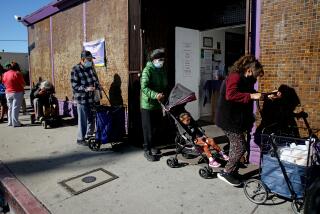County Votes $8.2 Million to Aid Mentally Ill Homeless
- Share via
An $8.2-million program to provide emergency care and shelter to as many as 12,000 homeless mentally ill people in Los Angeles County was unanimously adopted Tuesday by the Board of Supervisors.
The spending plan, prepared by the county’s mental health department, calls for the money to be used to help the homeless mentally ill obtain temporary shelter, food and medical services. Parts of the program also include long-term residential care, educational and crisis intervention services.
Supervisor Ed Edelman, a longtime advocate of increasing services to the homeless, generally favored the appropriation. But at the same time, Edelman expressed concern that a key element of the program--the placement of 200 emergency beds at existing community shelters--has not yet been defined.
“I want to know where these beds are going to be located. . . .” Edelman said. He said that most of the money should go to areas where the homeless mentally ill tend to congregate, primarily Skid Row and other downtown areas.
Roberto Quiroz, county mental health director, told the board that placement of the beds has not yet been determined, but he promised to return with a plan in the coming weeks.
A total of $7.4 million of the program’s money was authorized by state legislation that set aside $20 million statewide for those people considered homeless mentally ill or “at risk” of becoming homeless. Los Angeles County will provide the balance of the $8.2 million for the county program.
The Legislature required that the funds be used for food, shelter and medical services. But state lawmakers also specified that alternatives should be found to so-called “mercy bookings” in which some mentally ill homeless are temporarily housed in jails.
Officials estimate that about half of California’s 60,000 homeless live in Los Angeles County and that between 25% and 40% of that number are mentally ill.
The homeless mentally ill are considered in need of special attention because they often resist care and are unable on their own to seek out and obtain welfare services available to indigent people. The county program approved Tuesday represented another of several attempts during the last year to restore mental health funding that was greatly reduced following the passage of revenue-cutting Proposition 13 in 1978.
More to Read
Sign up for Essential California
The most important California stories and recommendations in your inbox every morning.
You may occasionally receive promotional content from the Los Angeles Times.













